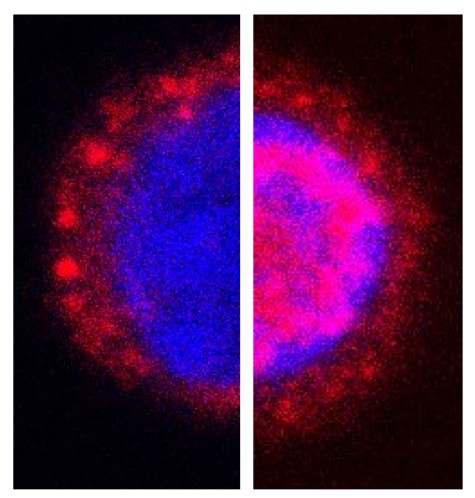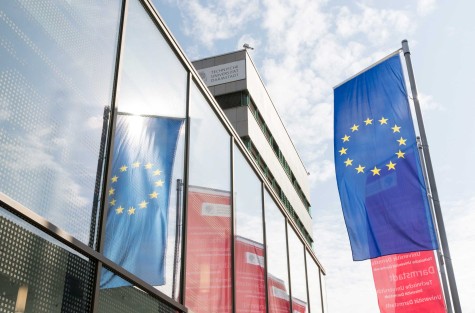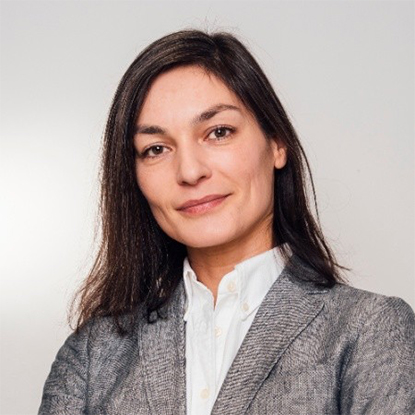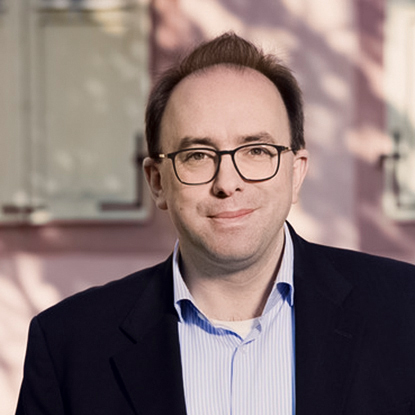-
![Prof. Heinz Koeppl im Gespräch mit einem Mitarbeiter im Labor.]() Picture: Katrin Binner
Picture: Katrin Binner![Prof. Heinz Koeppl im Gespräch mit einem Mitarbeiter im Labor.]() Picture: Katrin Binner
Picture: Katrin Binner2.7 million euros for the SYNSENSO Doctoral Network
2022/04/22
Programmable biosensors using synthetic biology: Funding as a Marie Skłodowska-Curie Action
The international “SYNSENSO” Doctoral Network that is coordinated by TU Darmstadt is developing a new generation of modular biosensors. The European Commission has now awarded the network a total of 2.7 million euros of funding as a Marie Skłodowska-Curie Action.
-
![T-Lymphozyten vor (links) und nach (recht) der Behandlung mit Röntgenstrahlung.]()
![T-Lymphozyten vor (links) und nach (recht) der Behandlung mit Röntgenstrahlung.]()
Weapon against Tumours, Boost for the Immune System
2022/04/20
Activating X-rays – Signalling Cascade in T-cells
Radiation therapy is a proven approach to destroying tumours. However, it is possible that it might be able to do even more in the future – namely stimulate the immune system at the same time and so fight cancer even more intensively. The foundations for this have been laid by researchers led by TU Darmstadt. They have found that x-rays trigger a calcium signalling cascade in cells of the immune system. The results have now been published in the “Journal of General Physiology”.
-
![Versuchsaufbau Laser]() Picture: Markus Roth
Picture: Markus Roth![Versuchsaufbau Laser]() Picture: Markus Roth
Picture: Markus RothDeeper insight thanks to neutrons from a laser source
2022/03/23
Publication in “Nature Communications”: Laser serves as compact particle accelerator
A team led by the Technical University of Darmstadt has for the first time made laser-generated neutrons usable for an industrial application. The researchers showed that neutrons generated compactly with lasers can be used in non-destructive material testing.
-
![]() Picture: Matthias Niethammer/TU Darmstadt
Picture: Matthias Niethammer/TU Darmstadt![]() Picture: Matthias Niethammer/TU Darmstadt
Picture: Matthias Niethammer/TU DarmstadtWhy Some Bubbles Move Faster
2022/03/03
Teams from TU Darmstadt and TU Graz explore motion in viscoelastic fluids
Why do large gas bubbles in viscoelastic liquids (such as polymer and protein solutions) rise so much faster than expected? An open question with great relevance for industrial production processes. Researchers at TU Darmstadt and TU Graz have now found an explanation and published it in the “Journal of Non-Newtonian Fluid Mechanics”.
-
![Athene Young Investigator Dr. Johann Isaak am supraleitendenden Elektronenlinearbeschleuniger S-DALINAC.]() Bild: Claus Völker
Bild: Claus Völker![Athene Young Investigator Dr. Johann Isaak am supraleitendenden Elektronenlinearbeschleuniger S-DALINAC.]() Bild: Claus Völker
Bild: Claus VölkerNukleare Photonik: Quantenoptik mit Kernphysik verknüpfen
2022/02/24
Forschende der TU Darmstadt geben Überblick
„Wo im Universum, und vor allem wie, werden die uns bekannten chemischen Elemente erzeugt?“ gehört zu den grundlegenden Fragestellungen in der Kernphysik. Neue Einblicke und Antworten, vor allem in den Aufbau von Kernmaterie, liefert das junge Forschungsgebiet „Nukleare Photonik“. In einem kürzlich in der Zeitschrift „Progress in Particle and Nuclear Physics“ erschienenen Übersichtsartikel haben Forschende unter Beteiligung der TU Darmstadt den aktuellen Forschungsstand und potentielle Anwendungen in Industrie und Technik zusammengefasst.
-
![Prof. Dr. Gerd Buntkowsky. Photo: Claus Völker]() Bild: Claus Völker
Bild: Claus Völker![Prof. Dr. Gerd Buntkowsky. Photo: Claus Völker]() Bild: Claus Völker
Bild: Claus VölkerErwin-Schrödinger-Preis 2021: Zwei Forscher der TU Darmstadt ausgezeichnet
2022/02/17
Durchbruch für Kernspinresonanz und Magnetresonanztomographie
Der „Erwin-Schrödinger-Preis 2021 – Wissenschaftspreis des Stifterverbandes“ ist an ein internationales und interdisziplinäres Team von Forschenden unter Beteiligung der TU Darmstadt und der Universität Mainz verliehen worden. Der Preis ist mit insgesamt 50.000 Euro dotiert. Prämiert wurde die Entwicklung einer kostengünstigen und außerordentlichen Verstärkung der Magnetresonanzsignale, die vielversprechend in der Analytik genutzt werden kann. Die Auszeichnung ist auch ein Erfolg für den Verbund der Rhein-Main-Universitäten (RMU) und die Wissenschaftsregion Rhein-Main.
-
![Das Proton (rot) hat einen Radius von 0,84 Femtometern (fm). In der Abbildung sind auch die drei Quarks dargestellt, aus denen sich das Proton zusammensetzt, sowie die Gluonen, die sie zusammenhalten.]() Picture: Dr. Yong-Hui Lin/Uni Bonn
Picture: Dr. Yong-Hui Lin/Uni Bonn![Das Proton (rot) hat einen Radius von 0,84 Femtometern (fm). In der Abbildung sind auch die drei Quarks dargestellt, aus denen sich das Proton zusammensetzt, sowie die Gluonen, die sie zusammenhalten.]() Picture: Dr. Yong-Hui Lin/Uni Bonn
Picture: Dr. Yong-Hui Lin/Uni BonnProtons are actually smaller than long thought
2022/02/04
Study suggests errors in the interpretation of older measurements
A few years ago, a novel measurement technique showed that protons are probably smaller than had been assumed since the 1990s. Physicists at the University of Bonn and the Technical University of Darmstadt have now developed a method that allows them to analyze the results of older and more recent experiments much more comprehensively than before.
-
![]() Bild: Dr. Felix Sommer/TU Darmstadt
Bild: Dr. Felix Sommer/TU Darmstadt![]() Bild: Dr. Felix Sommer/TU Darmstadt
Bild: Dr. Felix Sommer/TU DarmstadtLadungsradien als Prüfstein neuester Kernmodelle
2022/01/17
Team unter Beteiligung der TU Darmstadt forscht an exotischen Nickelisotopen
Ein internationales Forschungsprojekt unter Beteiligung von Kernphysikern der TU Darmstadt hat die modernen Möglichkeiten der Erzeugung radioaktiver Isotope genutzt, um erstmals die Ladungsradien entlang einer Reihe kurzlebiger Nickelisotope zu bestimmen. Damit lässt sich zeigen, dass neueste Kerntheorien die Radien gut vorhersagen können. Die Ergebnisse wurden jetzt in der Zeitschrift Physical Review Letters veröffentlicht.
-
![]()
![]()
Three million euros for pioneering research
2022/01/10
European Research Council funds two young scientists at TU Darmstadt with ERC Starting Grants
Two research projects at TU Darmstadt will in the future be funded by the European Research Council (ERC) as excellent and innovative basic and frontier research with ERC Starting Grants. A total of around three million euros will go to two Early Career Researchers.
-
![]() Picture: Klaus Mai
Picture: Klaus Mai![]() Picture: Klaus Mai
Picture: Klaus MaiScalable quantum processors in sight
2021/12/15
TU Darmstadt project paves the way for powerful quantum computers
A physics research group at TU Darmstadt, which has received funding of 3.3 million euros as part of the "Quantum Technologies“ program of the German federal government, is pursuing ambitious goals.
Research Field M+M
Archive
Archive






















